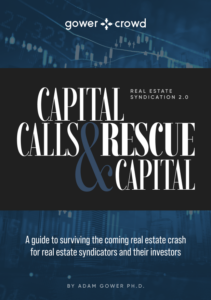The Best Social Media Platforms for Finding Real Estate Investors
Suppose you’re raising equity capital for real estate projects. In that case, especially if you operate an online platform of any kind, there’s a very good chance you maintain some kind of social media presence. Every social media platform has the ultimate goal of connecting you with people interested in what you offer or the content you post. The same applies to real estate syndication just as readily.
All social media platforms offer you access to different people under different circumstances. While two platforms may be similar, none are identical, which is a clear advantage to you. You can choose the best social network for your style of posting, your investor avatar, and your company’s exact value proposition.
By understanding each platform's strengths, you can pick your battles carefully and post the right content to the right place. You should post different content to each platform. If you want to optimize your social media presence and attract investors to your projects, you should especially post to the Big 4 social media giants.
Get free insights and education right in your email. Subscribe today!
Get access to our FREE weekly newsletter exclusively covering the latest updates from the real estate crowdfunding world
How Social Media Can Strengthen Your Real Estate Investor Network
Social media is a great way for any individual – or company – to grow their real estate investor network. What’s more, there’s no prescribed formula for how to utilize social media to that end. Real estate developers, syndicates, and others are becoming increasingly creative with leveraging these platforms to grow their investor networks.
Here are just a few ways they’re doing that.
High Quality Content
Sharing high-quality content is one of the best ways to grow your network of real estate investors. Moreover, when you publish well-researched and thoughtful information, it helps position you as an expert in the field. For example, someone looking to connect with investors might share a research brief that provides an overview of how COVID-19 impacts certain real estate asset classes (e.g., multifamily, industrial, office, retail, hospitality, etc.) and the outlook for these property types in the future.
This research brief would be timely, pertinent, and share high-quality statistics that the audience will find useful. Ultimately, this helps brand the person as a trusted resource for information, which will lead to more (and stronger) relationships with real estate investors over time.
Meet Like-Minded Individuals
Social media is a great way to network with like-minded individuals. Many platforms will feature “people you may know” – an invitation to connect with certain people based on your other connections and/or interests. On LinkedIn, for example, you’ll see whether you share any mutual connections to that person, and if so, how many. The more mutual connections you have, the more likely they’re in the same industry. They may even operate in complementary roles from which you can develop your network of investors.
One way to connect with those people is to ask a mutual friend to connect you via the social media platform. Or reach out directly, noting in your message that you have several mutual connections (or one particularly strong mutual connection) and why that person might be interested in chatting with you. Social media can be a highly valuable tool when connecting with real estate investors in a light-touch manner. These informal, online relationships often turn into strong personal relationships over time.
Advertise Your Property
Advertising has infiltrated nearly all social media platforms to some degree. As a result, many real estate developers (mortgage brokers and the like) can enjoy connecting with investors online. For example, a developer might publish an ad or post to their news-feed a description of a deal they’re just bringing to market. The post will include enough information to attract the attention of investors.
Another strategy is to be more passive, not directly advertising an investment opportunity but rather featuring a recently closed transaction.
For instance, a real estate developer might share a link to a news article that talks about selling a formerly vacant lot to his company. In it, they might include information in that article about the site's development into a new apartment building.
By the time this deal hits the news, the developer will likely already have raised significant capital. Instead, it’s a way to show how you’re staying active in the industry by saying something like, “We’re the proud new owners of this site – the deal is fully vested, so stay tuned for the next one!"
In this case, potential investors may be intrigued enough to follow you on social media to stay informed as the deal moves along, and they don't miss the next one. Just be sure to post updates regularly enough to keep your audience engaged.
Want to learn about Investor Acquisition? Learn more about our Master Course here.
List of Social Media to Help You Find More Real Estate Investors
Most people are familiar with LinkedIn as a tool for connecting with others in your industry. In this case, developers who are looking to find more real estate investors. Yet, LinkedIn is only one of several social media platforms that can help you forge new relationships. Each platform has slightly different purposes, strategies, and nuances. Read on to learn more about each.
Related: The Ultimate Guide to SEO for Real Estate Investors
Note: Don’t feel overwhelmed by all of these social media platforms! It’s not necessary for a real estate developer to be actively engaged on each platform. In fact, utilizing just one or two platforms very well can often be more effective than trying to use all platforms inefficiently.
Facebook has the distinction of being the most heavily populated social media network in the world right now. Since it’s been around for more than a decade, it’s weathered many storms already and implemented a ton of great functionality features.
Demographics on Facebook vary widely, but the fact is that almost everyone is on there. Overall, it tends to skew towards an older audience rather than a younger one. However, there are both old and young people on the platform. No matter who your ideal investor is, you’re likely to find them somewhere on Facebook.
Furthermore, you have a great many options for personalized content posting on Facebook. Everything from live videos to story posts and groups could come in handy, depending on who you’re trying to reach. You need to develop a solid content strategy to drive investor engagement on Facebook. Iif not, you could get lost in all the features and updates. Facebook can be either formal or informal, or both at the same time in different site areas. You want to be sure to carefully balance your personal with your professional postings.
We all know LinkedIn as a professional social network. This platform has an enormous variety of individuals and companies, and demographics fit into a wide range. The audience on LinkedIn tends to be older and more professional, though it’s not strictly for people in that category.
LinkedIn is a good place to publish content that’s polished and directly related to your investment strategy, modus operandi, and what your ideal investor cares about. You’ll be posting company achievements, thought leadership articles, deal updates, and other official statements as well.
Your profile on LinkedIn should be a place where investors can go and get a complete picture of what your company does, what your value proposition is, and as a resource for them to learn about real estate investment through the lens of your perspective.
If you’re going to regularly post content to LinkedIn, which is a good idea for sponsors, you should make sure you’re not clogging up the feed with things that don’t directly trace back your company. Save the fluff and the somewhat-relevant content for other platforms. Keep it straightforward, educational, and directly relevant on LinkedIn.
Just like Facebook, Instagram has a very large base of users. It’s distinct from Facebook in that it’s more of a younger crowd. It’s also distinct because of the image focus on Instagram, this platform tends to attract less formal posts and a more familiar atmosphere between connections.
You can use this familiarity and informal posting style to your advantage, even if you’re dealing in a traditionally formal and serious industry like real estate investment. Showing some glimpses from behind-the-scenes of your team or sharing in personal moments can work to draw in investors to your platform.
Instagram is a fantastic platform for building relationships. If you focus only on pitching through this platform, you won’t be successful. But, if you spend some time making more personalized posts, you can build a brand that draws people in. Make only a few direct product/platform advertisement posts out of your whole lineup. Give the bulk of the space to building a brand and a company image with followers.
Are you still looking for ways to finance your Real Estate Projects? Sign up for a workshop today!
Twitter is a great social platform for staying in touch with the fast-paced online world. You can keep up with what’s going on across the real estate syndication industry while jumping into conversations that are relevant to your specific real estate niche. Twitter has a huge user base from around the world, leaning towards young adults and mid-career professionals.
On Twitter, you can involve yourself in any conversation that’s going on by re-tweeting and adding your two cents. Using the right hashtags, you can also hop on certain trends, as long as they’re relevant to your objectives, and they make sense with your normal content.
The thing with Twitter is that it’s easy to get lost in all the noise. You want to post content that matters and can help you stand out from everyone else around you. Always be either extraordinarily useful or speak to a specific situation. That’s how you draw people in and create interest in your projects through Twitter.
Zillow
along with competitor platforms RedFin and Xome–is a popular real estate platform that can be used for listing properties, finding potential buyers, and more. It is frequently used by real estate buyers, speculators, and investors, making it a great place to launch a broader syndication campaign.
Currently, Zillow has about 36 million unique monthly users, making it the most popular social media platform completely dedicated to real estate. There are many different platform components where sponsors can interact with potential investors. For example, the Zillow discussion forum allows both parties to discuss relevant topics, including how syndication works, the benefits of investing in certain properties, and more.
Zillow is a great “jumping-off point” linked to outside blogs, fundraising platforms, sales pages, and more. Furthermore, the social and profile elements of the platform make it easier for users to develop critical relationships and expand their network. Over time, you can eventually turn these relationships into fruitful syndication partnerships.
TikTok
TikTok is arguably the hottest social media platform in the world. Between 2017 and 2021, the platform significantly increased its active users, growing from 65 million to 1 billion users in just four years. Currently, TikTok has the third most active monthly users of any social media platform globally, placing it well ahead of LinkedIn and even ahead of YouTube.
As a relatively new platform, TikTok’s user-base skews younger than Facebook and others, meaning the portion of users who are accredited investors is notably smaller. However, 37 percent of users are now over age 30, which is considerably higher than it was a year ago. The sheer growth and size of TikTok have caused it to become an essential platform for real estate fundraising.
TikTok primarily consists of short, often candid videos. You can use it for showcasing potential properties and helping people learn small snippets about the basics of real estate syndication. Over time, a well-coordinated TikTok campaign can generate significant results.
YouTube
YouTube is an essential resource for any syndication that hopes to use video marketing throughout its fundraising campaigns. And you probably should–the combination of audio and visual elements that video provides causes it to be much more enriching than content that only uses one or the other.
YouTube is an excellent platform for providing free educational materials. Creating videos that clearly explain the ins and outs of the syndication industry can help your syndicate build credibility among interested investors and establish itself as a thought leader. If you can be the one that exposes an investor to this market, they will be much more likely to select you as their go-to real estate partner. Additionally, YouTube is also great for showcasing properties without strict length limitations.
Pinterest is a platform that makes it easy to “pin” various things you are interested in, including interior design ideas, recipes, and–yes–even properties you are interested in investing in. Pinterest is likely a bit underutilized by firms involved in the real estate syndication space, but with 444 million monthly users–and at least some of these users being accredited investors–it’s a tough space to ignore willingly.
Pinterest, like other visually-dominated platforms, is great for showcasing properties. But you can also use it for showcasing other elements of your enterprise, including helpful graphics (charts, tables), inspirational quotes, quick lessons about investing, and more. In addition, because Pinterest is structurally a bit different from the other popular social media platforms, it is an excellent resource for rounding out and solidifying a broader social media fundraising campaign.
***
So many social media networks exist today. Almost any site with a large enough user base can act as a social network in its own right. Think about sites like Reddit, Medium, Quora, and others that have millions of active, engaged users but don’t fit the traditional mold of social media and are probably not suitable (yet) for real estate syndication.
Related: Building Your Real Estate Investor Network Online
The general strategy is the same for any social media platform. Get a feel for the posting climate and demographic on the platform, then focus on building up your audience and attracting investors with content that makes sense for the platform it’s on – and in all circumstances, provides value to your prospects and gives them an opportunity to take the next step in their journey getting to know you. Customize your posts to the platform so you can attract an audience with content that’s appealing within its own context.
Are you more of an audio person? Check out our podcast here!
If you have only just started in real estate development, have completed no deals, have no email list, but know you want the freedom and wealth being a real estate developer brings, then I suggest your first step is to start evaluating deals so you can recognize a good one when you see it.
Here’s where you should start. You’ll learn everything you need to know – the different types of real estate, different development strategies, how real estate cycles influence the market, and all about due diligence.
If you want to find deals and raise money for them so you can start your real estate development business, then learning how to conduct due diligence so you can pitch your deals better to investors is a great place to start.
If you’ve already purchased one or more real estate project and are seeing more opportunities than you can finance, then now is the time to start building your investor network so you can finance all your next deals quicker.
You’ve already got some momentum; now start finding and educating prospects about what you’re doing so you can build an email list of people to pitch to when you’re ready to raise money for your next deal.
This is what we build for private clients all the time – it’s called the Investor Acquisition System and you can access the entire program right here so you can find prospects, and convert them into being deep pocketed, repeat investors in your deals.
If you are a seasoned pro with multi-cycle experience, a substantial portfolio, a decent deal pipeline, and find yourself spending too much time raising equity capital because you’re still doing it in-person, then it’s time you put technology to work for you.
The wonderful thing about doing this is that you’re not going to be doing anything different than you’re already doing and, guess what, you’ll never have to sit through investor meetings again.
Sounds crazy I know, but I lay the whole thing out for you in this white board workshop where I personally show you exactly what it takes for you to transform your equity raising into a fully automated, capital raising machine so you can find new investors while increasing commitments from your existing network.






